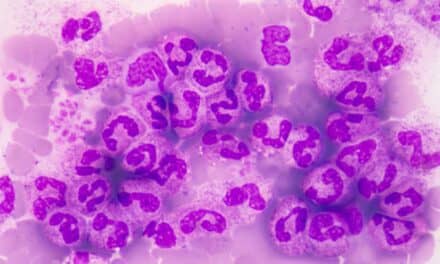Cytovale, a medical diagnostics company focused on providing rapid and insightful tools to improve early detection of fast-moving and immune-mediated diseases, revealed its 510(k) pending Cytovale system and 10-minute IntelliSep sepsis risk stratification test at the American Association for Clinical Chemistry (AACC) annual meeting.
The instrument can be seen in the Cytovale booth 5045 at AACC. The IntelliSep test was recently named an AACC Disruptive Technology Award Semifinalist and is also being featured in the Disruptive Tech area of the exhibit hall during the meeting.
Addressing Sepsis
Emergency department (ED) physicians tasked with diagnosing sepsis, a dysregulated immune (white blood cell) response to infection that can be life threatening, often face a scarcity of information that could lead to over- or under-treatment. To help address this challenge, the Cytovale system directly analyzes white blood cells using rapid techniques that look at cell structure, which may make it faster and less expensive than other approaches.
The IntelliSep test aims to simply and clearly determine the risk of a patient having sepsis using a biomechanical evaluation of white blood cells from a standard blood draw at presentation, generating results in under 10 minutes. Microfluidic cell-handling techniques combined with the technological advances of high-speed imaging and machine learning allow the Cytovale system to analyze the biophysical properties of tens of thousands of leukocytes, yielding a score called the IntelliSep Index (ISI).
The ISI results are stratified into three interpretation bands corresponding to regions of low (Green Band), intermediate (Yellow Band), and high (Red Band) risk for sepsis.
Cytovale recently fulfilled the target enrollment of the CV-SQuISH-ED study involving the IntelliSep test at four clinical study sites across the country and has included the data from that study in a 510(k) submission to FDA.1
“We’re excited to share the IntelliSep test with the global laboratory science community at AACC 2022. While nearly a dozen instruments have already been operated in clinical labs at facilities across the U.S., the next logical step now that the clinical validation study has been completed and our 510(k) filing has been submitted, is to engage more broadly with those who may benefit from our potentially critical and time-saving tool that could change the way emergency departments recognize and treat sepsis,” says Cytovale co-founder and CEO Ajay Shah. “We encourage all in attendance at the meeting to come learn about the investigational IntelliSep test and how it may address the need to more quickly and accurately assess and triage potential sepsis patients.”
Presenting Sepsis Data at AACC
Data being presented at AACC 2022 compare the ISI to ED diagnosis and indicates that the ISI could provide valuable information to help EDs rapidly triage patients more effectively. In the abstract, “A Rapid Cellular Host Response Test May Aid ED Decision Making for Sepsis Care” (Poster B-224), the ISI showed a significantly higher Positive Percent Agreement (PPA/Sensitivity) of 97.4% (86.2 – 99.9, 95% CI) and Negative Predictive Value (NPV) of 99.4% (86.2 – 99.9, 95% CI) with a Green Band cutoff compared to ED Diagnosis at 50.0% PPA (33.4 – 66.6, 95% CI) and 92.7% NPV (78.6 – 98.3, 95% CI), respectively.
The data, which draw from studies prior to CV-SQuISH-ED, will be presented by Hollis O’Neal, MD, critical care physician at Louisiana State University Health Sciences Center, Wednesday, July 27 from 1:30 to 2:30 pm CT in the poster hall.
“I see the potential for the investigational IntelliSep to have significant impact on improving sepsis identification and diagnosis in ED settings,” says O’Neal, who also served as national principal investigator for Cytovale’s clinical validation study. “Based on my analysis of the data available to date, I have hope that IntelliSep can improve outcomes, including ED throughput and progress in resource utilization, cost of stay, and ICU length of stay.”
Data from previously published studies have shown that Cytovale’s IntelliSep test quickly and clearly distinguished mortality risk in a high-acuity population and accurately identified patients with infections severe enough to cause morbidity and mortality2. These data demonstrate the 10-minute test’s potential to aid physicians in rapidly identifying patients at increased risk of having or developing sepsis.3
References:
1 This project has been funded in whole or in part with federal funds from the Department of Health and Human Services; Office of the Assistant Secretary for Preparedness and Response; Biomedical Advanced Research and Development Authority, under contract number 75A50119C00072.
2 Guillou, L. (2021). Development and validation of a cellular host response test as an early diagnostic for sepsis. PLOS ONE, April 15, 2021. https://doi.org/10.1371/journal.pone.0246980
3 O’Neal, Hollis R. Jr., et al. (2021). Assessment of a cellular host response test as a sepsis diagnostic for those with suspected infection in the Emergency Department. Critical Care Explorations. https://journals.lww.com/ccejournal/Fulltext/2021/06000/Assessment_of_a_Cellular_Host_Response_Test_as_a.27.aspx





